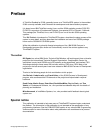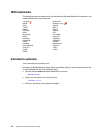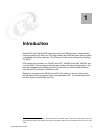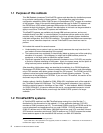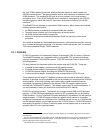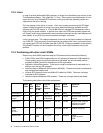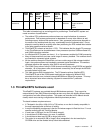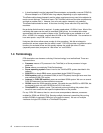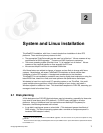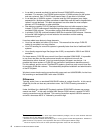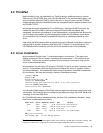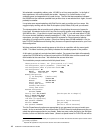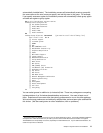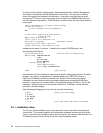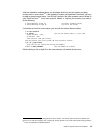
© Copyright IBM Corp. 2001 7
Chapter 2. System and Linux installation
ThinkPad/EFS installation, with Linux, is much simpler than installation of other EFS
platforms. There are three primary reasons for this:
The appropriate ThinkPad models can be used “out of the box.” We are unaware of any
requirements for BIOS upgrades.
1
There are no RAID functions to customize.
The server operating system (Red Hat Linux 7.1) is installed “out of the box.” We are
unaware of any required patches or fixes essential for EFS use.
We can use simple Linux files for emulated S/390 disks.
All of these factors are subject to change, of course, and are likely to change with future
systems. Nevertheless, we expect ThinkPad/EFS installation to remain simpler than
installation of other EFS systems. A background consideration is that, because
ThinkPad/EFS is not intended for production use, there is slightly less emphasis on using the
latest BIOS fixes, latest Linux fixes, and most optimum disk performance techniques.
We elected to have Linux as the only PC operating system on our ThinkPad. You could
create multiple primary partitions, install a boot manager of your choice, and install a
Windows system in addition to Linux. This should be transparent to FLEX-ES, assuming you
manage to install a functional Linux.
2.1 Disk planning
A little background on FLEX-ES disk techniques may be interesting, especially for those who
have used or read about other EFS platforms. FLEX-ES uses raw disks on its other
platforms. Using a UnixWare
2
base (as used with current Netfinity/EFS systems) for
discussion, the following elements are involved:
A raw disk is contiguous space on a hard disk. (This statement ignores the effects of
RAID striping. The Server operating system sees a raw disk as contiguous space if a
hardware RAID adapter is used.)
2
1
This is not to say that you should not install BIOS upgrades. We are unaware of any that are required for using
FLEX-ES.
2
These comments also apply to Netfinity/EFS with an Open UNIX 8 base. Open UNIX 8 is the replacement release
for UnixWare 7.1.1.



